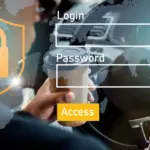10 Apr

In today’s digital age, data protection has become more critical than ever before. With the rise of cyber threats and data breaches, it is essential to take measures to protect your sensitive information when sharing it online. In this article, we will provide you with tips for securely sharing your sensitive information, ensuring that it is only accessed by the intended recipient.
1. Introduction
With the convenience of sharing information online comes the risk of data breaches and cyber threats. The consequences of such breaches can be severe, including identity theft, financial loss, and reputational damage. Therefore, it is essential to take measures to protect your sensitive information when sharing it online. In this article, we will provide you with tips for securely sharing your sensitive information, ensuring that it is only accessed by the intended recipient.
2. Understanding Sensitive Information
Sensitive information refers to any information that, if compromised, could harm an individual or organization. Examples of sensitive information include personal identification information (PII), financial information, and confidential business information. It is essential to be aware of the type of information you are sharing and its potential risks.
3. Risks of Sharing Sensitive Information
When sharing sensitive information, several risks come with it. The information may fall into the wrong hands, leading to identity theft, financial loss, or reputational damage. Additionally, sensitive information shared through unsecured channels may be intercepted, leading to data breaches or cyber threats.
4. Best Practices for Securely Sharing Sensitive Information
To protect your sensitive information when sharing it online, the following best practices should be observed:
Using Encrypted Messaging Services
Encrypted messaging services such as Signal and WhatsApp provide end-to-end encryption, ensuring that only the intended recipient can access the information. These services are safer than standard messaging services such as SMS or email.
Password Protection
Passwords are a vital aspect of data protection. Ensure that you use strong passwords and do not share them with anyone. Additionally, avoid using the same password across different platforms.
Avoiding Public Wi-Fi Networks
Public Wi-Fi networks are not secure and can be easily intercepted by cybercriminals. Avoid using public Wi-Fi networks when sharing sensitive information.
Limiting Access to Information
Only share sensitive information with people who need to know. Avoid sharing sensitive information on social media or other public platforms.
Verifying Recipients
Always verify the recipient of the sensitive information before sharing it. Cybercriminals often use phishing techniques to obtain sensitive information from unsuspecting individuals.
5. Additional Tips for Data Protection
In addition to the best practices mentioned above, the following tips should be observed to ensure data protection:
Keeping Software Up to Date
Ensure that all your software, including your operating system, is up to date. Updated software often contains security patches that help protect your information from cyber threats.
Using Two-Factor Authentication
Two-factor authentication adds an additional layer of security to your accounts. It requires a password and a verification code sent to your phone or email.
Backing Up Your Data
Always backup your sensitive data to ensure that you do not lose it in case of a data breach or other incidents. Regularly backup your data to an external hard drive or cloud storage.
Regularly Monitoring Your Accounts
Regularly monitor your accounts for any suspicious activity. Review your bank statements and credit card transactions to identify any unauthorized charges.
6. Conclusion
In conclusion, protecting your sensitive information when sharing it online is crucial. The tips provided in this article should be observed to ensure that your data is only accessed by the intended recipient. Always be vigilant and cautious when sharing sensitive information online.
7. FAQs
- Why is it important to protect sensitive information when sharing it online? It is important to protect sensitive information when sharing it online to prevent identity theft, financial loss, and reputational damage.
- What are some examples of sensitive information? Examples of sensitive information include personal identification information (PII), financial information, and confidential business information.
- How can I ensure that my sensitive information is secure when sharing it online? You can ensure that your sensitive information is secure when sharing it online by using encrypted messaging services, password protection, avoiding public Wi-Fi networks, limiting access to information, and verifying recipients.
- What should I do if I suspect a data breach or cyber threat? If you suspect a data breach or cyber threat, you should immediately contact your financial institution and change your passwords.
- How often should I backup my data? You should backup your data regularly, preferably on a daily basis, to ensure that you do not lose it in case of a data breach or other incidents.
Recent Posts
- The Ultimate Defense: Preventing Content Scraping on Your Website

- Mastering WordPress Security: Creating Strong Passwords

- The Ideal Number of WordPress Plugins: A Comprehensive Guide

- Protecting Your WordPress Site: The Importance of Intrusion Detection System (IDS)

- The Ultimate Checklist for Detecting a Hacked Website

Categories
- Data (1)
- Web Security (23)
- WordPress (14)
We provide round-the-clock protection for your website with our state-of-the-art managed security services. You can relax and enjoy peace of mind knowing that we’ve got you covered. Our assurance: if we can’t secure your website, no one can.
© 2024 Seqrex. All rights reserved.